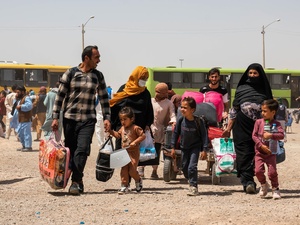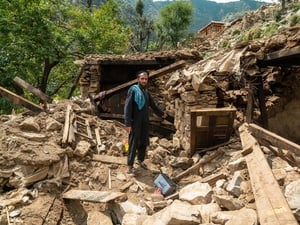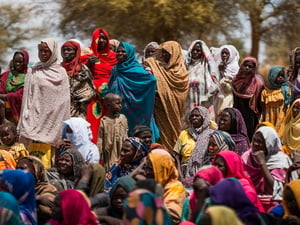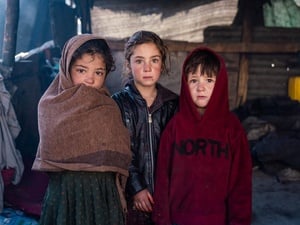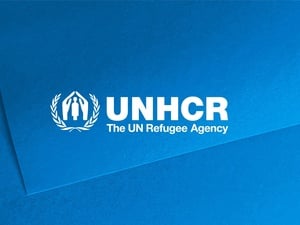Afghanistan Humanitarian Update No. 43
Afghanistan Humanitarian Update No. 43
At a Glance:
- UNHCR interrupts some activities following shooting incident
- Afghans flee to Pakistan
- Expatriate staff return to Herat, survey Hairaton
- Needs assessment begins in Kabul region
- Afghans to be helped home
UNHCR interrupts activities following shooting incident
UNHCR staff returning to the Pakistani provincial capital of Peshawar on Tuesday were fired on by unknown gunmen who tried to stop their well-marked UN vehicles. No one was injured in the attack in North-West Frontier Province.
The incident happened as the two UNHCR vehicles were returning to Peshawar Tuesday afternoon after escorting a convoy of Afghan refugees to UNHCR's newly established Kotkai camp. The attack occurred shortly after 4 p.m. when three men moved onto the roadway and pulled weapons from under their clothes and motioned for the two UN vehicles to halt. While the first UN four-wheel drive vehicle stopped, the second car overtook it and made to pass the gunmen, who then fired at least three shots into the vehicle in an effort to stop it. No-one was injured in the shooting, and the vehicle sped onward to the next police station. At the same time, the vehicle that had halted quickly turned around and went back to a police outpost.
Six UNHCR staff were aboard the two UNHCR vehicles.
UNHCR has temporarily interrupted Wednesday's relocation convoys in Peshawar while Pakistani authorities investigate the incident. Some 6,000 newly arrived Afghans have been shifted from a makeshift camp at Jalozai, near Peshawar, to the new site at Kotkai since the relocation convoys began a week ago.
Afghans flee to Pakistan
Afghans fleeing the Kandahar region for the safety of Pakistan's southern border town of Chaman report increasing insecurity in the region surrounding the Taliban's last stronghold and complain of a lack of food and other supplies.
Up to 3,000 Afghans are camped in the no-man's-land at the border crossing, with many people suffering through overnight sub-zero temperatures.
Pakistani authorities are permitting UNHCR to register only 250 to 350 persons daily at the Killi Faizo transit camp at Chaman, although there are some 600 empty tents at Killi Faizo able to accommodate the majority of the waiting Afghans.
Virtually all of those arriving in Killi Faizo over recent days are ethnic Pashtuns coming from a variety of areas across Afghanistan. About one-fifth of the new arrivals say they came from Kandahar. Those coming from northern Afghanistan say they left towns like Sheberghan and Mazar-i-Sharif ahead of the advancing Northern Alliance forces.
The newly arriving Afghans report that thousands more people remain in three makeshift camps sheltering displaced persons at Spin Boldak, just across the border from Chaman. The camps could shelter up to 60,000 displaced Afghans.
According to refugees who have been allowed to enter Pakistan, Taliban forces have reportedly left their guard posts around the makeshift sites at Spin Boldak, but remain present in the area.
Expatriate staff return to Herat, survey Hairaton
Following the UN's green light for the return of expatriate staff to Herat, a team of UN international aid workers, including one from UNHCR, are now in Afghanistan's main western city. UNHCR is making arrangements for the deployment of five more international staff who will join some 20 local colleagues who returned to work at the UNHCR office in Herat more than a week ago.
UNHCR's immediate priority in Herat is to prepare for the distribution of relief supplies to be sent aboard the refugee agency's second aid convoy that will be leaving the north-eastern Iranian city of Mashad in the next days. The supplies will include tents, cooking stoves, plastic sheeting, jerry cans and soap for thousands of displaced Afghan families living in desperate conditions in camps located in and around the western Afghan city.
Conditions permitting, UNHCR expects to re-open its field offices at the border town of Islam Qala west of Herat, and also its office further south in Farah Province. That office was looted early last week. The re-opening of these offices and deployment of staff will enable UNHCR to scale-up its quick impact projects and boost other rehabilitation activities focusing on potential areas of return for displaced Afghans still inside their homeland, as well as for refugees in neighbouring countries, particularly Iran. The rate of spontaneous returns from Iran is gathering pace, with average daily returns numbering some 1,200 persons. UNHCR and the government of Iran expect to see large-scale returns in early spring - if the conditions are right.
UNHCR staff on stand-by in Uzbekistan for eventual deployment to Mazar-i-Sharif were allowed to enter Afghanistan last Saturday. At the town of Hairaton, they met with the local colleagues from UNHCR's offices in Mazar-i-Sharif, Kunduz and Pul-i-Khumeri, and discussed necessary logistics and staffing issues in preparation for the eventual re-establishment of UNHCR's activities in those areas.
Needs assessment begins in Kabul region
UNHCR today began an assessment of the needs of tens of thousands of internally displaced people (IDPs) around Kabul. Working with some 175 mobile monitors from 35 local NGOs, the agency is surveying 56 districts in four provinces in and around Kabul. The survey is expected to take about two weeks, but UNHCR will begin delivering assistance as soon as the results are received identifying specific needs in each area. UNHCR plans to assist up to 50,000 IDPs in the area.
Over the weekend, UNHCR completed the distribution of winter emergency kits to 10,500 destitute people living in Kabul. The thousands of families identified in this first phase of UNHCR's assistance activities each received cooking and heating stoves, plastic tarpaulins, bags of charcoal, blankets, sweaters, and quilts.
Afghans to be helped home
UNHCR is preparing to help more than 30,000 Afghans back to their homes in the Shomali Plains north of Kabul. Some of these displaced Afghans are living in Kabul's former Soviet compound and in the Panjshir Valley in the north-west. The return operation could begin as early as next week.
Once the agency gets the green light from the de-miners, UNHCR will help IDP returnees with transport back to the Shomali Plain and, with other UN and relief agency partners will provide integration assistance, including shelter materials, water, health and education aid.
Meanwhile, UNHCR is continuing to monitor population movements into and out of Kabul. In the last week, more than 7,000 people have returned to the city. Out of this group, some 5,000 are IDPs who fled the city to escape the air strikes, while the remaining 2,000 are returning refugees from Pakistan.


